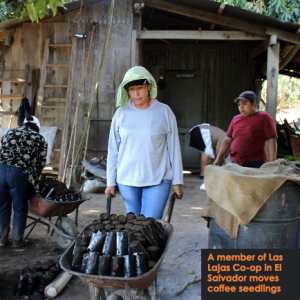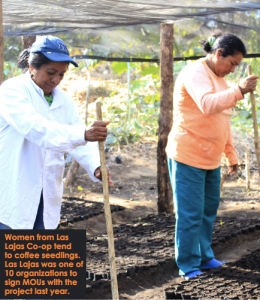With CLUSA El Salvador as primary sub-recipient, the project will work with 7,500 coffee producers, 50 producer organizations and cooperatives, and government agencies and the private sector.
Learn more and follow along on Facebook and YouTube for this project.
Coffee Seedling Nurseries Provide Hope
 Moving a small coffee seed from nursery to plantation is a delicate procedure. Moving over 350,000 coffee seeds is a large undertaking. Since January 2016, the Las Lajas Cooperative, with technical support from NCBA CLUSA’s USDA-funded Coffee Rehabilitation Project in El Salvador, has transplanted new rust-resistant varieties using the techniques and technology that will get them through the largest coffee crisis the region has ever seen.
Moving a small coffee seed from nursery to plantation is a delicate procedure. Moving over 350,000 coffee seeds is a large undertaking. Since January 2016, the Las Lajas Cooperative, with technical support from NCBA CLUSA’s USDA-funded Coffee Rehabilitation Project in El Salvador, has transplanted new rust-resistant varieties using the techniques and technology that will get them through the largest coffee crisis the region has ever seen.
A team of 50 people, 45 of them women, transplanted the seeds from the nursery to over 100 hectares (almost 250 acres) of coffee farms over first three months of the year.In addition to planting the new rust-resistant coffee type, called Icatu Amarillo or Icatu Yellow, training for how the co-ops transplant seedlings is also saving them time and money. Each transplanted seedling used to cost 30 cents including transport and planting, but with innovations like automatic hole diggers and smaller bags the farmers can move more seedlings more quickly. Each seedling transplant cost is now down to 12 cents.
And other co-ops in the region have taken note. In the first quarter of 2015, at the start of the Coffee Rehabilitation project, 950 farmers from 10 cooperatives had planted seedlings on nearly 5,500 acres using the rust-resistant varieties and low-cost technologies.
 And the innovations of smaller seedlings bags mean more seeds in each nursery, lowering the cost. Smaller bags, including using recycled soda bottles, which weigh about 1 pound with soil, upped their transplants rates to 1,000 per day compared to 600 per day with the traditional 3 pound bags, noted nursery manager Anotnio Chavez.
And the innovations of smaller seedlings bags mean more seeds in each nursery, lowering the cost. Smaller bags, including using recycled soda bottles, which weigh about 1 pound with soil, upped their transplants rates to 1,000 per day compared to 600 per day with the traditional 3 pound bags, noted nursery manager Anotnio Chavez.
Many co-ops did not have nurseries on site. Growing their seeds from scratch, they are able to start the process with the benefits of organic market prices and provide more jobs in a region struggling to combat coffee harvest losses from rust fungus.
“This is something we can’t quantify. The ability to have a job is invaluable,” said Sigfredo Benitez, General Manager for Los Pinos Cooperative, another co-op supported by the project.

